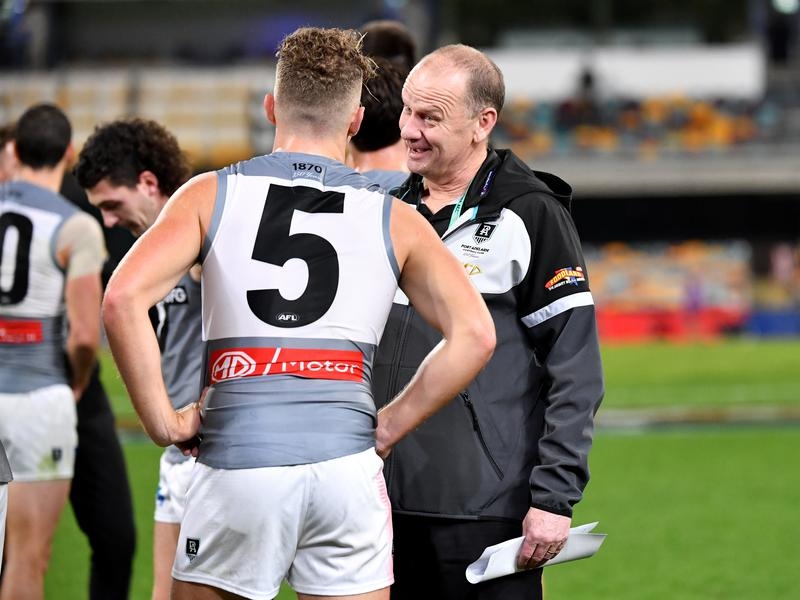
Ken Hinkley has always danced to his own beat.
As a dashing defender for Geelong, he’d tell teammates: “Mind my man, I’ll be back in three Brownlow votes.”
His best finish in the annual gong was third in 1992, with 17 votes.
Hinkley took the job as Port Adelaide coach in 2012, after a series of preferred candidates withdrew bids, spooked by the club’s then precarious financial state.
“People have said ‘last man standing’ … maybe I was the right man standing,” he said at the time.
His first official game in charge of Port was a 2013 pre-season fixture.
Post-match, Hinkley offered up an unseen injury to a player, saying he was going to be honest.
An honest coach? Yeah, right. See how long that lasts, thought the media pack.
Soon after, his first premiership game as Port’s coach was at the MCG.
Hinkley allowed television cameras and a commentator into his coaches’ box, an area deemed top secret and off limits by other coaches.
He took Port to the finals in his first season.
In 2014, the Power were pipped in a preliminary final by eventual premiers Hawthorn.
But the five following seasons, Port reached the finals just once – an extra-time, after the siren loss in a 2017 elimination final to West Coast.
After missing last year’s top eight the proverbial wolves were at Hinkley’s door.
The honest Hinkley had made it known his contract had a clause in it: reach the finals in 2020, get an extension. Miss the playoffs, no guarantee to keep his job.
But Hinkley and Port’s chief executive Keith Thomas knew the wolves would be kept at bay.
“We could see that we were on the right track in 2019,” Thomas told AAP.
“Even though the scoreboard looked much the same to the outside world.”
Hinkley and Thomas were right.
While this season unfolded in a state of change due to COVID-19, there was one constant: Port held top spot the entire home-and-away season.
“There were so many moments when the challenges of 2020 could have got on top of the team,” Thomas said.
“But this attitude of appreciating what we have, as opposed to worrying too much about what we didn’t have, is something that Ken and (assistant coach Michael Voss) Vossy have been driving into the group for a couple of years.
“I think it has served us well this year.”
Hinkley, an owner of greyhounds who likes a punt, has taken some gambles.
Hinkley traded out talent including Chad Wingard, Jared Polec, Dougal Howard, Jarman Impey, Paddy Ryder, Jasper Pittard, Sam Gray, Jackson Trengove and Brendon Ah Chee.
He’s traded in the likes of Charlie Dixon, Scott Lycett, Tom Rockliff, Steven Motlop, Ryan Burton and Trent McKenzie.
When holding top 20 draft hands, Hinkley has come up trumps.
Ollie Wines (pick seven, 2012), Todd Marshall (pick 16, 2016), Sam Powell-Pepper (pick 18, 2016), Connor Rozee (pick five, 2019), Zak Butters (pick 12, 2019) and Xavier Duursma (pick 18) form a core of Hinkley’s side.
That crop has been supplemented by shrewd mid-draft selections Tom Clurey (pick 29, 2012), Darcy-Byrne Jones (pick 52,2013), Karl Amon (pick 68, 2013), Riley Bonner (pick 37, 2015) and Dan Houston (rookie draft, 2015).
Some long-odds selections of recycled players missed: Jack Watts, Jimmy Toumpas, Jack Trengove, Dom Barry and Lindsay Thomas had little impact – but all cost next to nothing, mostly arriving as free agents.
“Ken has never lacked courage or a preparedness to put the club first,” Thomas said.
“But it was a very gutsy play.
“One of Ken’s greatest attributes is to ensure that every player on the list knows exactly where they stand – and they hear it directly from him.
“Sounds straight forward but it requires great personal commitment and discipline from the coach to maintain this standard.”
